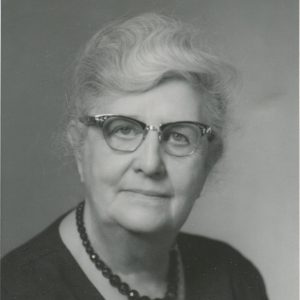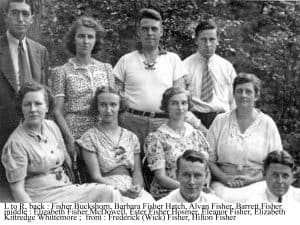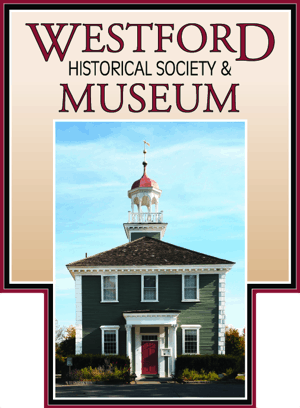Westford’s First Woman Doctor.
By James VanBever (Feb/March 2022)
When Elizabeth Kittredge was considerin g a career in medicine, she did not receive wholehearted support from her family. In fact, she received a letter from her stepfather the Reverend Louis Buckshorn of Westford, pastor of the First Parish Church in which he stated: “She would be spurned and scorned if she became a doctor and in which he offered to mortgage his home to help her get an advanced degree in education, if only she would give up the study of medicine.”
g a career in medicine, she did not receive wholehearted support from her family. In fact, she received a letter from her stepfather the Reverend Louis Buckshorn of Westford, pastor of the First Parish Church in which he stated: “She would be spurned and scorned if she became a doctor and in which he offered to mortgage his home to help her get an advanced degree in education, if only she would give up the study of medicine.”
Fortunately, Elizabeth Kittredge did not take her stepfather’s advice and did become a medical doctor. Ms. Kittredge would become one of the first female physicians in the United States. Said Elizabeth of her decision to enter medical school, “It was a time when young women wanted to do something useful.”
Dr. Elizabeth Kittredge was born in Westford in 1889, she was the daughter of Adeline Fisher and William Kittredge. Elizabeth’s father William died in 1892. However, her mother remarried the Reverend Louis W. Buckshorn, who had been the minister at the First Parish Church in Westford since 1896. The family then moved to Concord, New Hampshire, where Elizabeth would attend high school. In 1916, the family would return to Westford.
Elizabeth received her Bachelor of Arts Degree from Vassar College in 1912 and a year later received a Master of Arts in Pure Science from Columbia University. After graduating from Columbia, she taught science at the Laurel School in Cleveland, Ohio, and in 1918 Kittredge received a scholarship to the Johns Hopkins medical school. Elizabeth earned her Doctor of Medicine Degree from Johns Hopkins in 1922. After her internship at St. Elizabeth’s Hospital in Washington, D.C., she returned to Vassar College and served as a physician and instructor of physiology and hygiene for one year.
During this time Dr. Kittredge was able to maintain a small private practice, she preferred to work in clinics open to the public. This suited Elizabeth since she now had a young family, and the hours fitted her domestic responsibilities. It also showed how the young doctor was willing to dedicate her time and talents to help underprivileged people who needed medical attention.
Elizabeth’s husband, Herbert L. Whittemore, was a chief of engineers for the National Bureau of Standards. President Woodrow Wilson appointed Mr. Whittemore to this position in 1917. Elizabeth was known professionally throughout her career as Dr. Elizabeth Kittredge. The couple had two children, a daughter Nancy, and a son William.
Following her year at Vassar College, Dr. Kittredge returned to the D.C. area, where the Washington, D.C. the Medical Society selected her as a staff member of the Child Welfare Clinic of Children’s Hospital. During her career, Elizabeth also worked as a physician for the Maternal and Child Health Clinics and for the Board of Public Welfare in the District of Columbia. Elizabeth was also a member of the Women’s Medical Society of Washington, D.C., and a Fellow of the American Medical Association. In addition, she was a pioneer in the establishment of the Planned Parenthood Clinics.
Dr. Kittredge’s medical career included serving as the executive secretary of the American Medical Women’s Association and was editor of the association’s first publication, “Women in Medicine” and also edited other AMWA publications, including “Year Book.” In 1961, the AMWA awarded Kittredge the Elizabeth Blackwell medal for her commitment to promoting women in medicine. The award given by the AMWA is named after Elizabeth Blackwell who was the first woman to receive a medical degree. It is the highest award granted by the AMWA.
Although Dr. Kittredge spent most of her adult life in the Washington, D.C. area, she and her family always spent their summers in Westford with her brother Fisher Buckshorn. She had deep Westford roots and her town and country should be proud of her remarkable life. As she said when entering medical school, “It was a time for young women to do something.” Elizabeth Kittredge certainly lived up to this motto.
Dr. Elizabeth Kittredge died in Washington, D, C. in July 1972.
Sources:
Goudsward, David, The Westford Knight and Henry Sinclair, p. 9.
Journal of the American Medical Women’s Association, March 1962.
The Medical Woman’s Journal, p. 267., “Elizabeth Kittredge, M.D.”
Washington Evening Star, July 25, 1972, p. 21. “Dr. Elizabeth Kittredge, Clinic Pioneer, Dies.
Lowell Sun, July 15, 1954, p. 20.
Ibid, July 13, 1961, p. 34. “Dr. Elizabeth Kittredge, “Native of Westford Honored in Washington.”
A special thanks to Virginia Moore, J.V. Fletcher Library, Reference Librarian
 Alvan Fisher, Jr., remembers his first Cousin once removed; “I remember Elizabeth well . . . as she was a large woman (perhaps six feet tall) with a booming voice, it was hard to miss her! She’d often stop by our house in Natick on the way to and from Washington, and we’d never fail to see her with husband Herbert and the kids at the Fisher Family Reunions held at her mother’s (Adaline Buckshorn) place on Depot Street.”
Alvan Fisher, Jr., remembers his first Cousin once removed; “I remember Elizabeth well . . . as she was a large woman (perhaps six feet tall) with a booming voice, it was hard to miss her! She’d often stop by our house in Natick on the way to and from Washington, and we’d never fail to see her with husband Herbert and the kids at the Fisher Family Reunions held at her mother’s (Adaline Buckshorn) place on Depot Street.”
From: The Sunday Star, Washington D.C., May 2, 1971
Doctors on Birth Control
“When Dr. Elizabeth Kittredge, 81, went to medical school, circa 1920, sex wasn’t mentioned in obstetrics classes and she and her women colleagues learned about contraception from a copy of ‘Married Love’ by Marie Stopes which was smuggled in from England and passed around the table.
“‘You didn’t speak about it, lawdy, no!!!’ say Dr. Kittredge, who spent the last 10 years of her medical career, 1955 to 1965, working in Planned Parenthood clinics. She says the only time in her life when she broke the law was when, after her marriage in 1923, she obtained a diaphragm from ‘a doctor in Baltimore’.
“‘The doctor was breaking the law, too,’ she adds.
“Contraception, Dr. Kittredge recalls ‘was such a taboo subject in those days, even medical people had to get their information clandestinely. It was illegal to send books on sex and contraception through the mail because the subjects were considered obscene..’ Even so, doctors were mailed publications on the subject in unmarked brown covers and wrapped in brown paper without return addresses.
Smuggled Books
“Dr. Kittredge remembers one brave male physician who carted home from Massachusetts a suitcase full of copies of a book on sex techniques by a country doctor. He carried his clothes in a paper bag.
“‘We all prayed the suitcases wouldn’t break open,’ says Dr. Kittredge.
[Paragraphs on a Dr. Groben skipped.]
“Both Dr. Groben and Dr. Kittredge are ‘pre-Pill’ doctors. Dr. Kittredge, who speaks about birth control with refreshing matter-of-factness, graduated from Vassar in 1912, got a master’s at Columbia in ‘pure science’ in 1915, then taught science at a small private school ‘until the war came’.
“Offered a scholarship to Johns Hopkins, she decided to become a doctor; it was a time when young women wanted to do something useful, she says. After interning at St. Elizabeth’s Hospital in the District in 1922, she never had more than a small private practice, preferring to work in District clinics where the hours suited her family responsibilities. She and her husband, the late Herbert L. Whittemore, who was a notable chief of engineers at the National Bureau [of Standards], had two children, William Whittemore and Mrs. Nancy Simon.” (contributed by Alvan Fisher, 2022)
